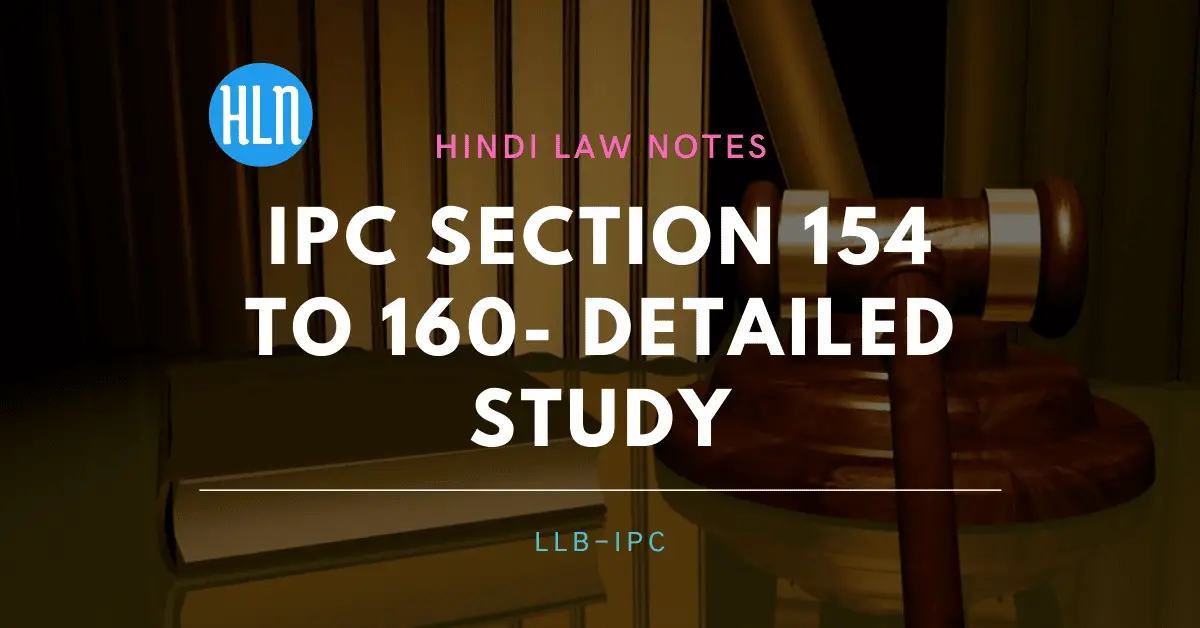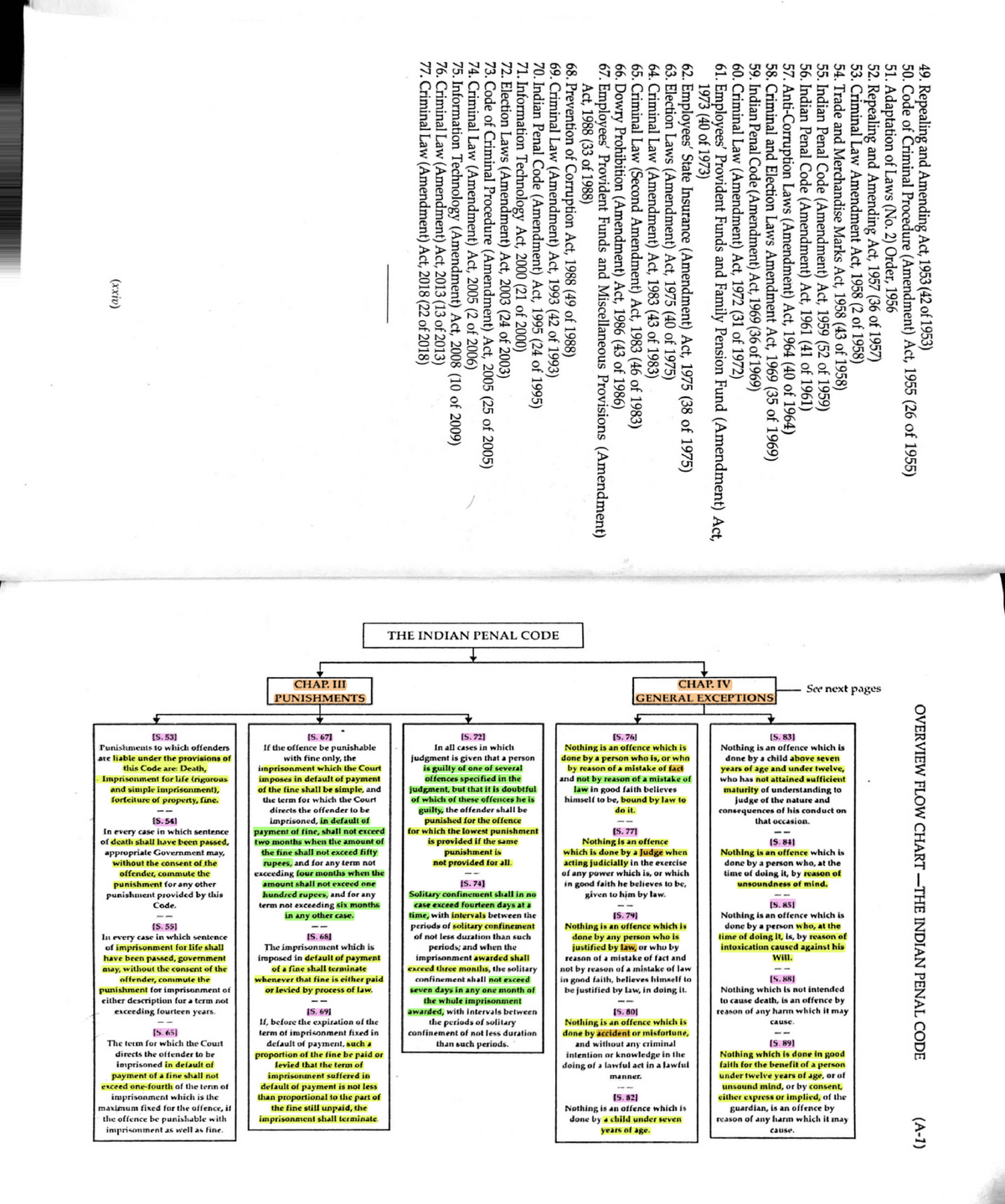
ipc section 154 IN HINDI dhara 154 kya hai 154 dhara kya hoti धारा 154 ipc 154 with
July 18, 2023 by Ragini Pathak The Indian Penal Code (IPC) is a comprehensive legislation that defines various criminal offenses and prescribes punishments for them. Within the IPC, Section 154 holds significant importance as it deals with the registration of the First Information Report (FIR).

भारतीय दंड संहिता धारा 154 से 160 तक का विस्तृत अध्ययन Hindi Law Notes
According to the IPC section 154, Owner or occupier of land on which an unlawful assembly is held Next. Read more at latestlaws.com. Monday, 08, Jan, 2024 .

Section 302 IPC Punishment for Murder under IPC 302 Advgyan
Section 154 in The Code Of Criminal Procedure, 1973. 154. Information in cognizable cases. (1) Every information relating to the commission of a cognizable offence, if given orally to an officer in charge of a police station, shall be reduced to writing by him or under his direction, and be read Over to the informant; and every such information.

Know every details related to IPC section 302 YouTube
Whenever any unlawful assembly or riot takes place, the owner or occupier of the land upon which such unlawful assembly is held, or such riot is committed, and any person having or claiming an interest in such land, shall be punishable with fine not exceeding one thousand rupees, if he or his agent or manager, knowing that such offence is being.

Section 154 CrPC read with Section 166A IPC YouTube
The fundamental premise of Section 154 IPC is to hold the owner or occupier of a property accountable for their premises. In the eyes of the law, they are presumed to have control over the activities taking place on their land. Unlawful Assembly Criteria

IPC SECTION 154 in hindi.Indian Penal Code,1860 (LAW)151 160]dhara ipc sectionभारतीय दण्ड
IPC Chapter VIII; S. 154 Owner or occupier of land on which an unlawful assembly is held: Description; Whenever any unlawful assembly or riot takes place, the owner or occupier of the land upon which such unlawful assembly is held, or such riot is committed, and any person having or claiming an interest in such land, shall be punishable with fine not exceeding one thousand rupees, if he or his.

154 ipc YouTube
Section 154 IPC. 154. Owner or occupier of land on which an unlawful assembly is held. Whenever any unlawful assembly or riot takes place, the owner or occupier of the land upon which such unlawful assembly is held, or such riot is committed, and any person having or claiming an interest in such land, shall be punishable with fine not exceeding.

Ipc Sections... Robbery
Indian Penal Code IPC 505 PDF IPC 505 - Statements conducing to public mischief (1) Whoever makes, publishes or circulates any statement, rumour or report,— (a) with intent to cause, or which is likely to cause, any officer, soldier, 3 [sailor or airman] in the Army, 4 [Navy or Air. « ‹ 1 2 3 4 5 › »

IPC Section 154 जिस स्थान पर जमा हो गैरकानूनी भीड़, उसी से जुड़ी है आईपीसी की ये धारा Indian
Section 154 Crpc:- . 154. Information in cognizable cases. (1) Every information relating to the commission of a cognizable offence, if given orally to an officer in charge of a police station, shall be reduced to writing by him or under his direction, and be read Over to the informant; and every such information, whether given in writing or reduced to writing as aforesaid, shall be signed by.

किसी की निजी जमीन पर बल्वा हो जाए तो क्या भूमि स्वामी भी अपराधी माना जाएगा ASK IPC SECTION 154
Owner or occupier of land on which an unlawful assembly is held.—Whenever any unlawful assembly or riot takes place, the owner or occupier of the land upon which such unlawful assembly is held, or such riot is committed, and any person having or claiming an interest in such land, shall be punishable with fine not exceeding one thousand rupees, i.

IPC Diagram IPC Chart I zyxwvutsrqponmlkjihgfedcbaZYXWVUTSRQPONMLKJIHGFEDCBA THE INDIAN
The term FIR is not defined in the Indian Penal Code (IPC), Code of Criminal Procedure (CrPC), 1973, or in any other law. However, in police regulations or rules, information recorded under Section 154 of CrPC is known as First Information Report (FIR). Features of FIR. Some major aspects of a First Information Report (FIR) are:

[PDF] List of IPC Sections in Hindi DCSD.IN
— Whenever any unlawful assembly or riot takes place, the owner or occupier of the land upon which such unlawful assembly is held, or such riot is committed, and any person having or claiming an interest in such land, shall be punishable with fine not exceeding one thousand rupees, if he or his agent or manager, knowing that such offence is bein.

IPC Section 154 Owner Or Occupier Of Land On Which An Unlawful Assembly Is Held
According to Section 155 of the Criminal Procedure Code, 1973, if a police officer obtains information on the commission of a non-cognizable offence, he is required to record the case's details in the station diary and direct the informant to contact the relevant magistrate.

Section 306 IPC Abetment of suicide Century Law Firm
Section 154 of the Indian Penal Code states that whenever a riot or an unlawful assembly occurs the owner or the occupier of that land has to be punished with a fine of the amount which shall not exceed 1000 rupees.
🎉 Section 188 ipc. Can’t invoke Section 188 for not following Model Code, says court. 20190212
According to section 154 of Indian penal code, Whenever any unlawful assembly or riot takes place, the owner or occupier of the land upon which such unlawful assembly is held, or such riot is committed, and any person having or claiming an interest in such land, shall be punishable with fine not exceeding one thousand rupees, if he or his agent.

Section 506 of IPC Criminal Intimidation
THE INDIAN PENAL CODE _____ ARRANGEMENT OF SECTIONS _____ CHAPTER I INTRODUCTION PREAMBLE SECTIONS 1. Title and extent of operation of the Code.. 154. Owner or occupier of land on which an unlawful assembly is held.. Non-appearance in response to a proclamation under section 82 of Act 2 of 1974.